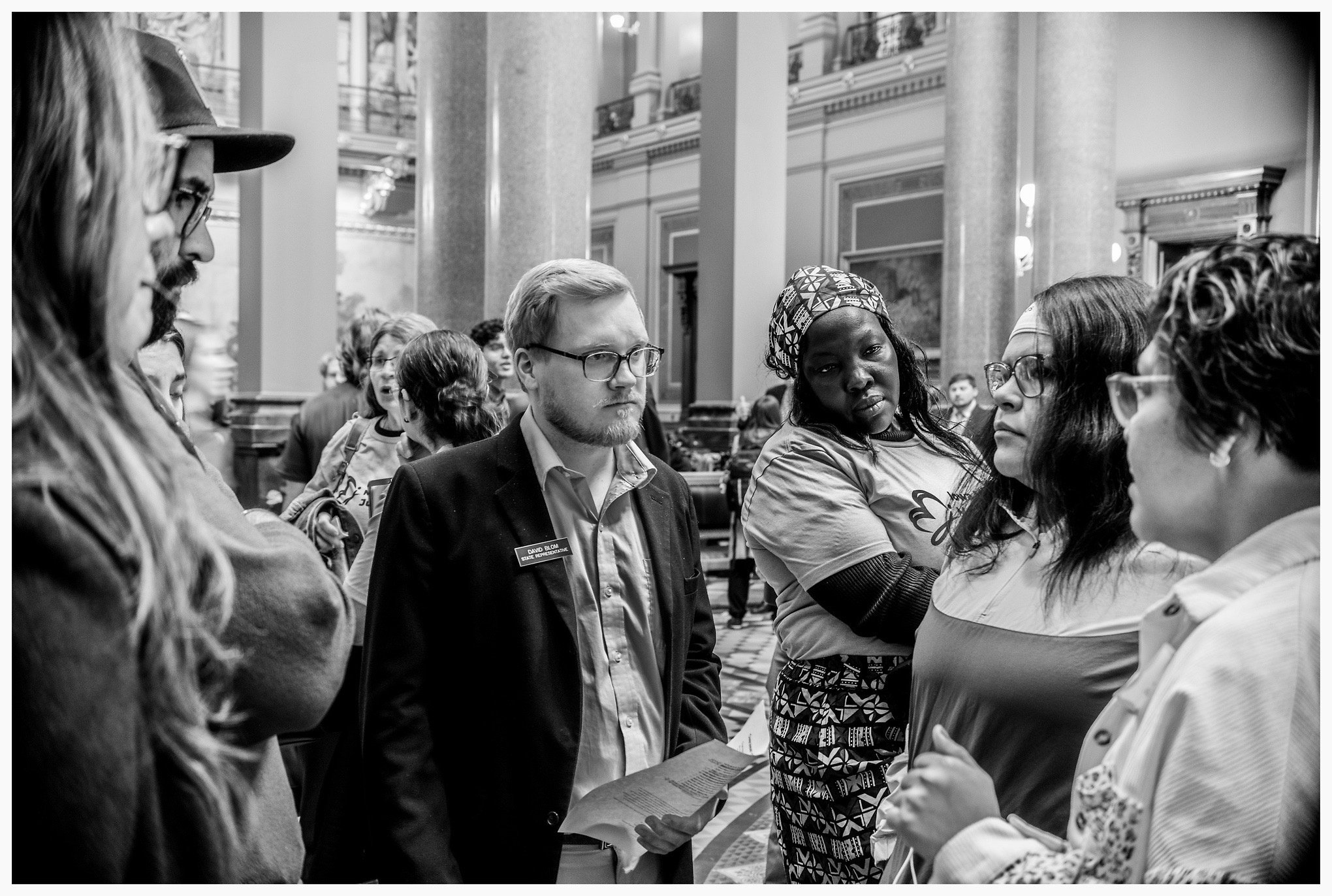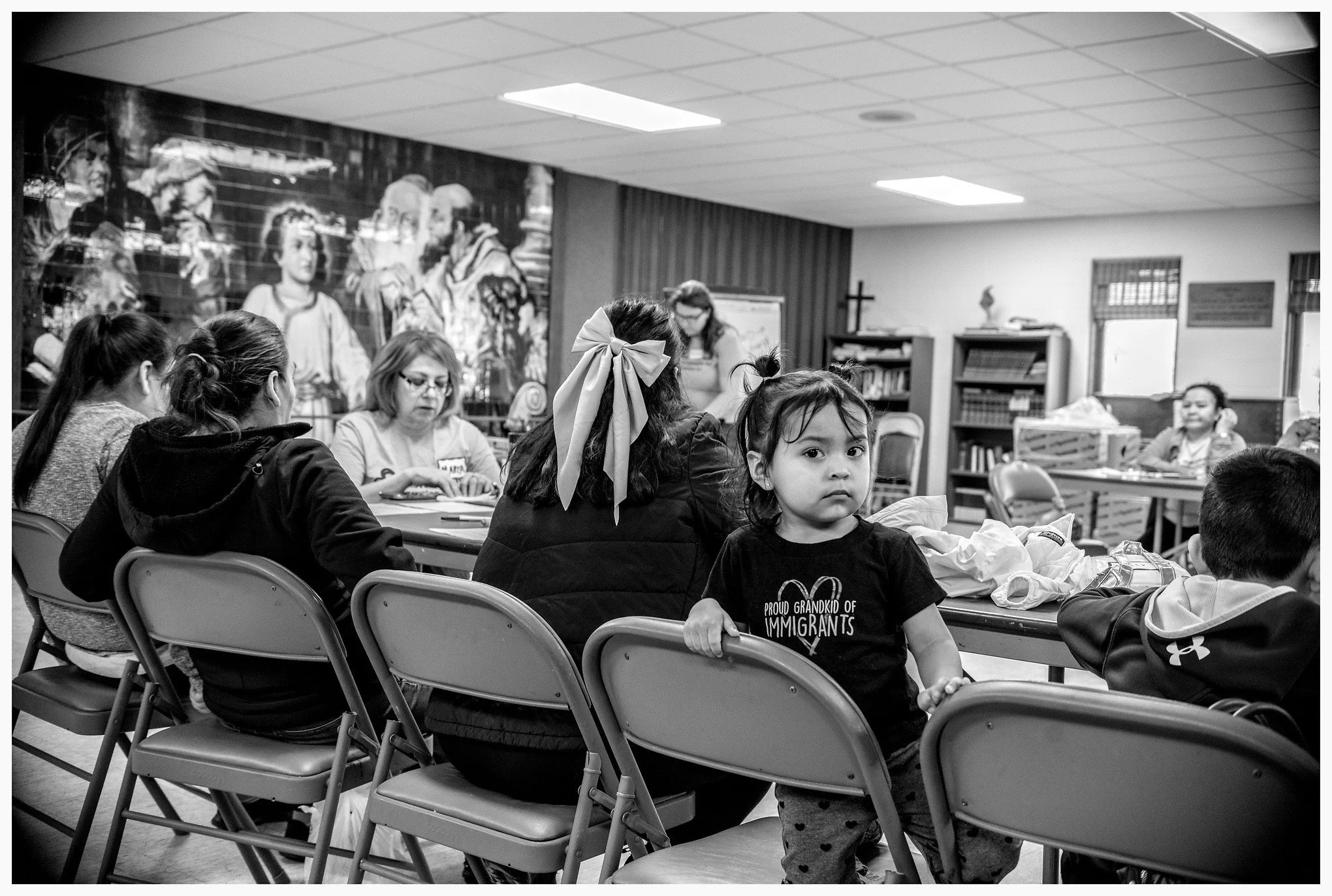
About the Project
“Iowa NICE, Make Iowa Nice Again” is a poetic visual exploration of the conflicting emotions experienced by the Iowa community at a time when the cultural label “Iowa NICE” is fading.
Iowa NICE
Make Iowa Nice Again

The term “Iowa Nice” defines the state of Iowa as a place where residents are amiable, friendly, welcoming, and kind. It establishes it as a community where everyone is received with warmth and compassion. It particularly highlights the genuine kindness and emotional trust extended to individuals who are otherwise strangers.
“Make Iowa Nice Again” refers to a time in Iowa’s history when welcoming immigrants and refugee newcomers was an honored and celebrated tradition.
“Iowa NICE, Make Iowa Nice Again” is an interactive photo and video documentary that uses the solid form of water—ICE—as a visual metaphor to experiment with new ways of narrating the experiences, feelings, and emotions of Iowa participants. By establishing an analogy between the words “NICE” and “ICE”—where omitting the N transforms “nice” into “ice”—the project seeks to reveal why Iowa, historically recognized as a tolerant, friendly, and welcoming state, especially toward newcomers, immigrants, and refugees, is becoming an increasingly cold environment.
Introduction

This metaphorical coldness numbs the senses, emotions, and core values such as inclusion, solidarity, love, and kindness, leaving behind feelings of hatred, fear, and violence.
This growing coldness and loss of empathy have led Iowa lawmakers to propose, debate, and pass unconstitutional, anti-immigrant laws that force local police to act like ICE (Immigration and Customs Enforcement), a function that, by law, should be carried out by the federal agency responsible for enforcing U.S. immigration laws.
In response, state and local organizations working with immigrants and refugees have been forced to constantly mobilize to counter the harmful effects of this coldness, its impact on the Iowa community, and its detrimental effects on the core values that once gave Iowa its reputation for kindness and friendliness.
Throughout this project, we are interviewing Iowans through conversations, documenting their stories, and creating photographic and video footage of them and the events and activities organized by organizations dedicated to counteracting hate and fear. These organizations, along with members of the community, are called “The Ice Breakers.”
With these interviews, we learn about the emotions and feelings surrounding the meaning of “Iowa Nice” and discover whether it truly reflects the sentiment and actions in harmony with being an Iowan. We identify the core values that need to be reinforced to help break the ice, centering on the hope that, through the ice, we will find a fine line of light—strong enough to warm dormant hearts and start to melt and break the ice.
The collected footage, photographs, posters, and videos are shared bilingually through MakeIowaNice.com and social media. These are presented as stories and short informational clips that convey the sentiment, values, and actions needed to “Make Iowa Nice Again.”

Throughout the 1800s and early 1900s, European immigrants settled in Iowa, often arriving from Denmark, Norway, Germany, Italy, Greece, and Czechoslovakia. In the 1970s, following the Vietnam War, Iowa welcomed the Tai Dam and other Southeast Asian refugees.
With this Iowa started to be recognized as a welcoming state, by the 1980s, the Iowa Refugee Services Committee (IRSC) became part of the Iowa Department of Human Services, later renamed the Bureau of Refugee Programs, and eventually the Bureau of Refugee Services. During the 1990s, the number of Latino newcomers in Iowa grew rapidly.
By 2000, most immigrants and refugees came from Asia, Africa, Latin America, and the Balkans. Iowa also saw increasing populations of Bosnian, Sudanese, Afghan, Ukrainian, Congolese, and Somali refugees.
In recent years, since 2017, Iowa’s Republican governor, senators, and House representatives have used immigrants and refugees as scapegoats, mirroring the political campaigns of the current federal administration.
By March 2025, refugee resettlement agencies in Iowa will be nearly out of funding after the Trump administration halted financial support for new arrivals.
Historical Background

Mission
With this project, we seek to counter the fear and hatred fueled by prevailing false narratives that are harming the entire Iowa community, especially its immigrant members.
We aim to promote core values such as love, inclusion, and honesty. We will counter hate with love, and fear with experiences that foster connection and communality, bridging division by establishing new points of genuine, honest human interaction.
We center on the idea that once the ICE melts, it will turn into water that nourishes the seeds of hope, bringing forth new blooms and growing flowers and trees of resilience. This symbolizes the creation of a sustainable and inclusive Iowa, where we are all connected—an Iowa where the values of love, solidarity, respect, responsibility, honesty, freedom of expression, empathy, kindness, compassion, and humility carry real meaning, rather than being empty words or unattainable ideals.
We envision a community where all its members see themselves as part of a diverse, inclusive, and multicultural whole, collaborating and creating a society where its leaders truly represent and strive to “Make Iowa Nice Again.”
Values
In this project, we are guided by three core values: LOVE, HONESTY, and INCLUSION. However, if we work to develop even just one of these values, this simple fact gives life to many other positive values and qualities that will help us achieve our goal of Making Iowa Nice.

-

LOVE
LOVE is the best way to combat hatred and fear. In its pure essence, it is the intense feeling of UNITY by presenting a feeling of sincere APPRECIATION and affection, where KINDNESS and mutual care are essential to TRUST.
-

HONESTY
HONESTY is acting with TRANSPARENCY and TRUTH in all interactions, with RESPONSABILITY, making personal and collective commitments for the common good. RESPECTING, recognizing, and valuing the identities, ideas, and beliefs of others, thus ensuring that each person can communicate their thoughts and ideas without fear.
-

INCLUSION
INCLUSION encourages the active participation of all people, values DIVERSITY and differences, generates EMPATHY to attend, accept, and share the feelings of others, and strengthens coexistence and SOLIDARITY where there is COOPERATION and a COLLABORATIVE sense of COMMUNITY.








